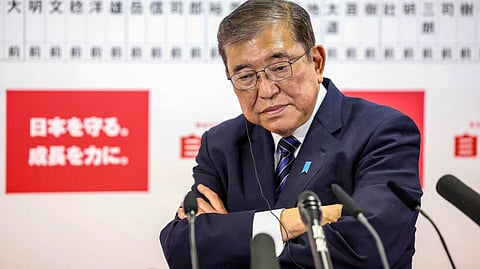
- NEWS
- the EDIT
- COMMENTARY
- BUSINESS
- LIFE
- SHOW
- ACTION
- GLOBAL GOALS
- SNAPS
- DYARYO TIRADA
- MORE

Japanese Prime Minister Shigeru Ishiba departed Sunday for a four-day trip to Vietnam and the Philippines, aiming to bolster regional ties amid escalating trade tensions triggered by U.S. President Donald Trump's sweeping tariffs.
The visit comes days after Chinese President Xi Jinping completed his own tour of Southeast Asia, as Beijing moves to portray itself as a stable partner in contrast to the United States' volatile trade policies.
Before departing, Ishiba described Vietnam, the Philippines and the wider Southeast Asian region as a "growth centre" driving the global economy, but warned of “major impacts” from Trump’s tariffs, which could affect both regional economies and Japanese businesses operating there.
"We would like to listen carefully to the opinions and concerns of Japanese companies in the region and make use of that in how we deal with the tariff measures," he told reporters in Tokyo.
Japan, the largest investor in the United States, has been hit by U.S. duties on car, steel and aluminum imports. While Tokyo was included in a blanket 10 percent levy, Trump has temporarily paused a proposed 24 percent "reciprocal" duty on Japanese goods.
Vietnam and Cambodia — where Japanese firms have increasingly relocated operations to avoid previous U.S.-China trade tensions — have also seen proposed reciprocal tariffs of 46 and 49 percent respectively put on hold.
Ishiba is also expected to raise concerns over China’s growing assertiveness in regional waters, particularly in the East and South China Seas, where both Vietnam and the Philippines have been locked in maritime disputes with Beijing.
"There are attempts by China to unilaterally change the status quo by force, and we would like to further strengthen our security cooperation" with Hanoi and Manila, Ishiba said.
